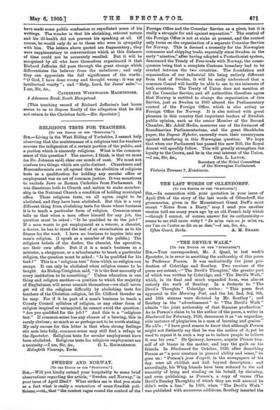[To THE EDITOR OY THE "SPECTATOR."] SIR, — Living in the West
Riding of Yorkshire, I cannot help observing that the maintenance of a religious test for teachers arouses the indignation of a certain portion of the public, and a portion which is sincerely religious. What is the common- sense of this question P The answer, I think, is that we must (as Dr. Johnson said) clear our minds of cant. We must not confuse two things which are quite distinct. Churchmen and Nonconformists are all agreed that the abolition of religious tests as a qualification for holding any secular office or employment was an act of common justice. It was monstrous to exclude Jews or Roman Catholics from Parliament. It was disastrous both to Church and nation to make member. ship in the National Church a condition of holding municipal office. These religious tests, we all agree, ought to be abolished, and they have been abolished. But this is a very different thing from abolishing tests for those whose business it is to teach a particular form of religion. Common-sense tells us that when a man offers himself for any job, the question must be asked : " Is he qualified to do the job ? " If a man wants to get employment as a weaver, a chemist, a doctor, he has to stand the test of an examination as to his fitness for the work. I have no business to inquire into any man's religion. (I speak as a member of the public.) The religious beliefs of the doctor, the chemist, the operative, are their own affair. But if it is a man's business as a minister, a clergyman, or a schoolmaster to teach a particular religion, the question must be asked : "Is he qualified for his task ?" This is a " religious test" from which no religion can escape. It can only be abolished when religion ceases to be taught. As Bishop Creighton said, " it is the first necessity of every institution to be something." Unless education is one thing and religion another—a position to which the majority of Englishmen will never commit themselves—we shall never get rid of the religious difficulty by abolishing tests for teachers of the Christian religion, let Dr. Clifford thunder as he may. For if it be part of a man's business to teach a County Council syllabus of religion, or any other form of religion inspired or uninspired, he cannot avoid the question : " Are you qualified for the job ? " And this is a " religious test." If common-sense has any chance of a hearing, this is surely obvious ; so much so as perhaps not to be worth stating. My only excuse for this letter is that when strong feelings stir men into folly, common-sense may still find a refuge in the Spectator. Religious tests for secular employment have been abolished. Religious tests for religious employment are










































 Previous page
Previous page